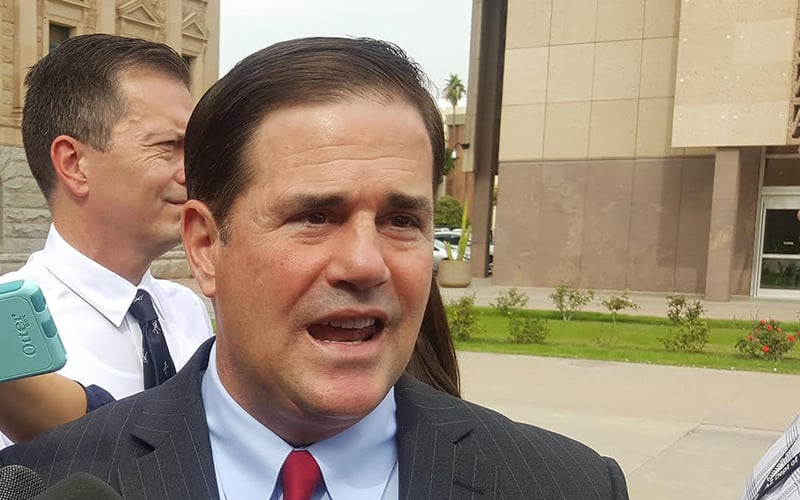
Arizona Gov. Doug Ducey kicked off Red Ribbon Week during a speech on the state Capitol lawn. He announced a new executive order, which places a seven-day limit on the first fill of prescription drugs for state employees and those in the Arizona Health Care Cost Containment System. (Photo by Michelle Chance/Cronkite News)
PHOENIX – Arizona Gov. Doug Ducey on Monday signed an executive order that will prohibit millions of Arizonans from filling initial prescriptions for more than seven days’ worth of opioids.
The limit includes both initial and subsequent prescriptions for children. However, the limit excludes opiate prescriptions for children with “cancer, chronic disease and traumatic injury,” according to a news release from the Governor’s Office.
The order only affects state employees and those in the Arizona Health Care Cost Containment System, the state’s Medicaid program, which covers about 1.9 million individuals and families in Arizona.
“This is a preventive step and one we hope employers and (private) insurance providers will follow our lead to address the scourge of addiction on the front end,” Ducey said during a kickoff event for Red Ribbon Week – an annual substance abuse awareness campaign – on the capitol lawn.
The governor said addiction affects one in every three households, and opioid abuse costs Americans more than $700 billion every year in health care and incarceration expenses.
Share your story:
Do you or someone you know have experience with opioids? | Cronkite News
In Arizona, health care costs related to opioid abuse costs the state an average of $104 per Arizonan, Ducey said.
To ease the strain, the Phoenix Police Department’s Maryvale-Estrella precinct will pilot a new program.
During the event, Maryvale police Cmdr. Sean Connolly announced the Angel Initiative, which encourages addicts to seek help and treatment directly from law enforcement.
According to the Governor’s Office website, the program encourages addicts to enter the police department, turn their drugs over and request treatment without fear of prosecution.
“We need to be looking at addiction as not a crime,” Connolly said.
Addiction is responsible for more annual youth deaths than suicide, firearms, school violence and car accidents combined, Ducey said.
To combat the issue, the Ducey encouraged parents, educators and community members to immerse their children in hobbies, sports and the arts to strengthen drug prevention early on.
“It’s much easier to say ‘no’ to drugs and alcohol when our kids know that they have better things to do,” Ducey said.
Angie Geren, a Chandler mother of four and advocate for youth and adults struggling with addiction, said Ducey’s suggestion was “realistic” because hobbies offer children a personal and emotional connection that is lost through addiction.
Through her organization, Addiction Haven, Geren provides resources and lobbies for progressive opioid legislation.
Geren said communication with children about drug abuse and what is expected from them is important in preventing addiction.
“For my kids, we had a rule that once they turned 14, they would be subject to random drug tests,” Geren said.